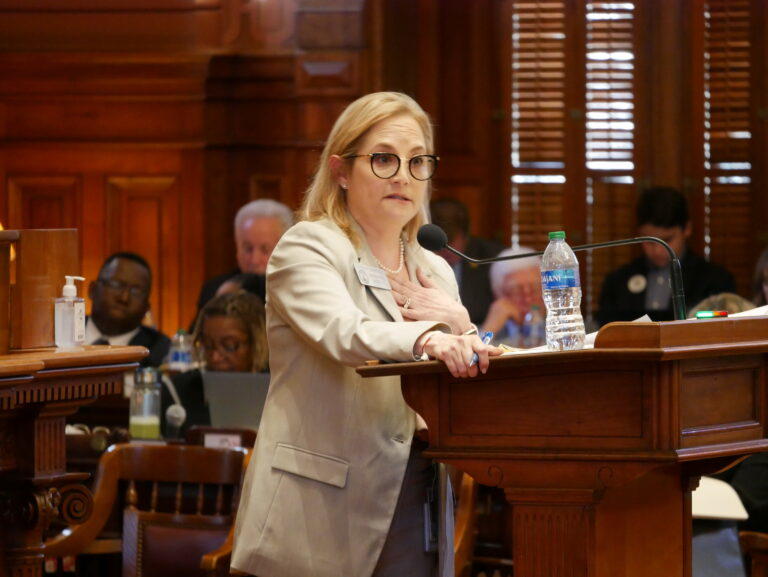
Section Branding
Header Content
Georgia Today: Delta preps for the Masters; Port of Brunswick motor vehicle cargo; Uga Ten dies
Primary Content
On the Tuesday, Jan. 23 edition of Georgia Today: Delta wants your trip to The Masters to be a little bit easier; the Port of Brunswick makes a run to become the country's top facility for vehicle cargo; and we pay our respects to a beloved University of Georgia icon.

Peter Biello: Welcome to the Georgia Today podcast from GPB News. Today is Tuesday, Jan. 23. I'm Peter Biello. On today's episode, Delta wants your trip to the Masters to be a little easier. The Port of Brunswick makes a run to become the country's top facility for vehicle cargo. And we pay our respects to a beloved University of Georgia icon. These stories and more are coming up on this edition of Georgia Today.

Story 1:
Peter Biello: Delta Air Lines is nearly doubling its seat capacity on flights to Augusta Regional Airport for this year's Masters Tournament. The Atlanta-based airline says it's offering six new routes and more than 1,300 daily seats to Augusta from April 7z through April 15. The new routes include Washington, D.C., Boston and Austin. Delta also will resume Masters Week flights from New York's LaGuardia airport and expand services from Atlanta. The golf tournament provides a crucial annual boost to Augusta's economy, estimated at $120 million. The city's airport has been expanding to accommodate more passengers.
Story 2:
Peter Biello: Former University of Georgia mascot Uga X, the winningest mascot in the history of the university's football team, has died. UGA said today the beloved white English bulldog, known as Que, died at his home in Savannah at age 10. His eight-year run as mascot from 2015 to 2022 included back-to-back national championships.

Story 3:
Peter Biello: A bill to define anti-Semitism in Georgia law stalled last year over how the measure should be worded, but now it's moving ahead, backed by a push to support Israel in its war with Hamas and amid a surge in antisemitic incidents. GPB's Sarah Kallis reports, the state Senate Judiciary Committee unanimously backed the measure yesterday.
Sarah Kallis: Senators heard testimony both in support and against House Bill 30 before passing the bill. Some of its opponents say it would limit free speech, but sponsors say the bill does not apply to speech alone. HB 30 was proposed last year but stalled in the Senate. Its co-sponsor, Rep. Esther Panitch, said this year is different.
Esther Panitch: Well, I think the whole world saw what happened on Oct.7. And, and the fallout to the Jewish community, to Jewish communities around the world.
Sarah Kallis: The bill will need final approval in the Senate and then go back to the House so it can OK the Senate's changes. For GPB News, I'm Sarah Kallis at the state Capitol.
Story 4:
Peter Biello: The Georgia Board of Natural Resources today approved funding requests from a state sales tax on sporting goods that Georgia voters overwhelmingly supported in a 2018 state constitutional amendment. If approved by Georgia lawmakers, the Georgia Outdoor Stewardship Fund would contribute $21 million toward 13 statewide conservation projects. The largest proposed allocations, $3 million each, would go to the Glynn County Coast Guard Beach Park and the trust for Public Lands Chattahoochee Riverlands regional trailhead.
Story 5:
Peter Biello: Georgia is investing in mental health treatment by funding new crisis stabilization centers. GPB's Ellen Eldridge reports, the latest one is in Fulton County.
Ellen Eldridge: When a person with substance use disorder needs immediate care due to withdrawal symptoms or mental health struggles, a behavioral health unit can help. Kalia Sprouse is a woman in recovery from addiction. She says when she grew tired of being sick, she reached out to a facility in Gainesville.
Kalia Sprouse: I called them, I said, "hey, you know, I'm full blown addiction right now. Lost my mind. I need help." And they're like, "okay." Well, you know, it's a crisis center, so of course they're going to keep you for about — they kept me for about a week or so and they got me started on my recovery journey.
Ellen Eldridge: A bed study completed last year shows Georgia will need eight additional crisis centers in the next decade, in addition to the 22 it currently has. For GPB News. I'm Ellen Eldridge.
Story 6:
Peter Biello: The mayor of Plains has resigned after serving 40 years in office. Boze Godwin served the small Southwest Georgia town, home to former President Jimmy Carter and his late wife, Rosalynn, since 1979, with a four-year break in the 1980s until last week. The 80-year-old announced at a council meeting that he was stepping down because of health problems. He says he's most proud of town residents who helped make the Jimmy Carter National Historic Site a reality, and those who helped rehabilitate Plains' downtown and populate it with businesses.
Boze Godwin: This thing I did as mayor was just, when the wheel needed greasing a little bit, do it. What I could do through the city. But basically, just stay out of these people's way and let them go. Their ideas are better than mine. They had a good drive. The thing for me to do just shut up. It's the only way we accomplished having a National Park Service here. We got all the building downtown, have been rehabbed and the business and every one right now. We're just proud. I'm proud of all the citizens of Plains and all the help that they gave me. And directions that President Carter gave me. He didn't give me political advice, but he gave me some directions. "Don't you think this is a good idea?" You know, that kind of thing.
Peter Biello: Godwin says the biggest change in Plains since 1979 is the pride residents take in the town, something he attributes to the Carters. The population, however, has remained about the same: about 700 residents.

Story 7:
Peter Biello: The Carlos Museum at Emory University, says it has returned three pieces of art to Greece that it believes were wrongfully taken from the country. The three pieces are a Greek marble seated figure, a marble sculpture of a goddess or muse, and a bathtub known as the Larnax. The Carlos acquired these pieces in 2002 and 2003, and recently determined the pieces had at some point been in the possession of known antiquities traffickers, or had been illegally excavated. This comes after the Chronicle of Higher Education reported last year that Greece asked for these pieces to be returned in 2007. The report also accused the Carlos of possessing more than 500 objects of uncertain origin. In a press release, Emory says the museum continues to study the provenance of objects in its collections. In recent years, the Carlos has repatriated items to Italy, Iraq and Egypt.
Story 8:
Peter Biello: The world of maritime shipping has no shortage of jargon. Stevedores are the dockworkers who load and unload cargo. Panamax refers to the maximum size of a ship that can pass through the Panama Canal. And then there is Ro-Ro, short for roll on, roll off. It's cargo on wheels, mostly motor vehicles. Right now, the Port of Baltimore is the busiest place for Ro-Ro in the U.S., but it's facing some stiff competition in Georgia. GPB's Benjamin Payne reports.
Benjamin Payne: A Nissan Rogue rumbles down a wooden ramp, exiting the cargo bay of a massive ship by the name of Neptune Ace. Normally, you wouldn't want to hear any squeaking from a brand new car, but in this case, no need to worry. It just comes from a protective covering around the wheel. Neptune is basically a floating parking garage. This SUV is one of about 700,000 vehicles in 2023 to pass through the Port of Brunswick, in rural Glynn County, Ga. Population: 85,000.
Griff Lynch: We're going to be all in to take the Georgia Ports Authority from the southeast gateway to a national gateway.
Benjamin Payne: That's Griff Lynch, president of the Georgia Ports Authority, speaking in October before a packed conference hall of business leaders.
Griff Lynch: Down in Brunswick, we have the single largest Ro-Ro facility — roll on, roll off facility — in the nation. It's not the busiest; it will be. That's my promise.
Benjamin Payne: Within five years, he says. Brunswick is currently the second-busiest Ro-Ro port in the nation and only getting busier. In its last fiscal year, it saw about 18% more cargo than the year prior. So what explains the growth? The No. 1 reason, Lynch tells me later on:
Griff Lynch: The population base is growing. It's growing in the Southeast faster than any other place in the U.S. And then secondly, we have an increased manufacturing base. Companies like Mercedes-Benz, BMW, Volvo.
Benjamin Payne: He also points to Hyundai, which in nearby Bryan County is building a massive $7.6 billion electric vehicle and battery plant, the largest economic development project in Georgia's history. Another factor driving growth for the Port of Brunswick has more to do with what isn't there, as opposed to what is. Unlike the Port of Baltimore, which is locked in by the rest of the city, the Port of Brunswick is in a spacious unincorporated part of the county, and what that allows for...
Susan Gardner: Is a very quick access to the interstate to head north and south from Brunswick.
Benjamin Payne: Susan Gardner is vice president of operations at the Georgia Ports 30.
Susan Gardner: We also have the rail connectivity there. So I feel like the connection with the railroads, as well as the connection to the interstate, makes it a very fluid port to import and export out of for autos. And that's one of the reasons that our customers actually want to be there.
Benjamin Payne: Yet another advantage has to do with what's going on about an hour's drive north. That's a heavy load carrier called Big Lift Baffin, hauling four massive cranes to the Port of Savannah. It's among the nation's busiest container shipping ports. Peter Hall is a professor of urban studies at Simon Fraser University in Vancouver, where he researches ports. He says there's been a shift in manufacturing to Southeast Asia that favors East Coast ports in the U.S.
Peter Hall: That has a knock on effect for the — for the Roro traffic
Benjamin Payne: Since Georgia's container shipping traffic goes through Savannah, Brunswick can focus on Ro-Ro. But it's not all smooth sailing, in part due to Glynn County's aging demographics.
Don Asdell: Our population continues to grow every year, but the growth isn't really with the workforce.
Benjamin Payne: Don Asdell is president of International Auto Processing. The company puts the finishing touches on many vehicles arriving at the Port of Brunswick.
Don Asdell: This area has a lot of people moving here. They're retirees and they're not part of the active workforce. So our challenge is trying to get people coming out of the local school system to want to stay here, as opposed to moving away to larger cities like Atlanta.
Benjamin Payne: Labor demand is exceeding labor supply in Brunswick, so it's no wonder that Asdell says his company hasn't laid off any workers in the eight years he's been here. Right now, the port can handle up to three Ro-Ro ships at once. A fourth berth is in the works and should be up and running by 2026. For GPB News, I'm Benjamin Payne.

Story 9:
Peter Biello: Last week at the World Economic Forum in Davos, Switzerland, Gov. Brian Kemp told leaders of the electric vehicle industry he knows the state needs more green energy if it wants to continue to be a hotspot for building EVs. Those comments came after the first Public Service Commission hearings on Georgia Power's request to radically ramp up electricity production. Joining me now is GPB's Grant Blankenship, who's been following the hearings. Hey, Grant.
Grant Blankenship: Hey, Peter, how are you?
Peter Biello: I'm doing well, thanks. First, remind us what Georgia Power is asking for. And why are they asking for it?
Grant Blankenship: Yeah. So Georgia Power says we're in what they call an extraordinary period of industrial growth in manufacturing in Georgia. And as you said, that's for things like electric vehicles, but it's also for solar panels. And it's for more and more of these internet data centers that are powering things like streaming video and social media. These are all enormously power-hungry places. In some cases, a single one of these facilities can use as much energy as one of the new nuclear reactors that Plant Vogtle can produce. So Georgia Power says, we have so many new customers that are coming online in the next two years that the utility runs the risk of not being able to produce enough energy for them.
Peter Biello: Okay. And they're calling this an emergency. What's their remedy to that?
Grant Blankenship: Well, the remedy is maybe a little ironic, given that except maybe for the data centers, what we're talking about here is what a lot of people call green technology, right? So first, Georgia Power wants new turbines at their own Plant Yates in Coweta County. Those will burn either natural gas or even oil. Then they want permission to keep running coal-fired generators at Plant Bowen and Plant Scherer longer than they told the state that they would. And then they have this special deal with their sister company, Mississippi Power, which means a coal plant there in Mississippi, which they no longer really need, would still be up and running, too. There's some natural gas generated power they want to buy from Florida at another site that would otherwise be idle, and then rounding it out, there's some battery storage next to preexisting solar generation next to two of the state's air force bases. But really, the bulk of this, when you look at it, it's fossil fuel rich and it's carbon emitting.
Peter Biello: We're calling it irony that we're using, a not very clean source of energy to help create, the infrastructure needed for more EVs. Is there any talk of this being sort of a temporary measure to get toward an overall cleaner energy future?
Grant Blankenship: Yeah, absolutely. I mean, Georgia Power will argue that that all along there's a road plan to going fully green in their energy portfolio. What this IRP request does is just extend that road, that — that runway toward a carbon-free future by that many more years. So this isn't like they're saying "we're never going to go fully green." It just pushes that horizon way into the future. In a time when, you know there's lots of alarm bells sounding around the world about last year being the hottest year on record, when — when there's a renewed urgency to go carbon free right now.
Peter Biello: So at these Public Service Commission hearings, other stakeholders can register to cross-examine Georgia Power and question their reasoning. What did that sound like over two days?
Grant Blankenship: Right. So what Georgia Power is really primarily concerned with making sure they don't scare away new business. One existing customer you may have heard of, the Department of Defense, they really grilled Georgia Power executives about this request to change what's called their Integrated Resource Plan, or IRP, for short. DoD attorney John McNutt reminded Georgia Power's Jeffrey Grubb that the company had agreed to help the military abide by a presidential executive order to decarbonize their electricity by 2030. Here's McNutt, followed by Grubb.
John McNutt: Why didn't you include our requirements your IRP since we're one of your existing customers, not some potential future hypothetical customer in the future?
Jeffrey Grubb: While we are going to work with the — the federal government on this and work on programs and will work on future resources, it doesn't factor directly into all of our planning, because again, we're looking at the cost for — for all customers. And I know you're a big one, but we've still got to look at everything.
Peter Biello: Hypothetical future customers. What do we actually know about how Georgia Power is making predictions about these customers?
Grant Blankenship: Companies say they're going to come to Georgia and build things all the time, right? Only some of them, in the end, pull it off. Georgia Power's computer model is meant to account for that uncertainty. When a company says they might land a factory here, their computers run 100,000 separate simulations describing all the ways that promise for a new factory could pan out. So that's like everything from abject failure to total success. All those simulations get plotted on a bell curve. You know, it's like fat and tall in the middle and skinny at the ends. I'll let Jennifer Whitfield of the Southern Environmental Law Center and Georgia Power's Fernando Valle pick it up from the hearing from here.
Jennifer Whitfield: Right. I mean, that's the whole point, is that the middle of that curve is your most likely load based on your expert assumptions. Correct?
Fernando Valle: Correct. It gives you it gives you an expectation of probability for each one of the levels on the range.
Grant Blankenship: Okay. Again it's fat in the middle of the curve, and that's the most likely projection of future energy needs. And by their own math, Georgia Power says if they stick with that fat middle of the curve, we might not need new fossil fuel generation. But Georgia Power's Jeffrey Grubb told the PSC they aren't sticking with that most likely scenario. He says if they did:
Jeffrey Grubb: We would likely be having to turn customers away from choosing the state of Georgia.
Peter Biello: So what projection is Georgia Power using?
Grant Blankenship: Well, yeah. So they're basing their projections on the most optimistic plot on their bell curve way out there on the skinny end, in order to have enough headroom for projects which, statistically, are really the long shot projects.
Peter Biello: Okay, so how did any of this go over with the Public Service Commission?
Grant Blankenship: Well, you know, it's hard to say. They keep their cards close to their vest. But at one point, Commissioner Tim Echols said the request for all this new generation felt like, you know, a little too much, too quickly.
Tim Echols: Almost feels like we're in a hurry, that we're, you know, rushing. When we're rushing, I wonder if we are more prone to make a mistake.
Peter Biello: So what's next?
Grant Blankenship: All right, so there are more hearings like these planned for February and March, two days in each month. And then the Public Service Commission will make its decision on whether to allow Georgia Power to add more fossil fuels to its portfolio sometime in mid-April.
Peter Biello: Grant Blankenship, thank you very much.
Grant Blankenship: Yeah, thanks for having me, Peter.

Story 10:
Peter Biello: Savannah once again will host a large marathon in November. City officials said today that a group funded by the nation's milk producers will present the Every Woman's Marathon in Savannah. The news comes two years after the city canceled the Rock 'n' Roll Marathon, in part because of disruption to residents and businesses. Mayor Van Johnson says this race will be different.
Van Johnson: The Rock 'n' Roll Marathon, its highest was probably about 20, 21,000 runners. This is maybe 5,000. So again, it's maybe, a fourth of what it was before. So again, and then the Rock 'n' Roll Marathon had, you know, 5K and it had a half-marathon. So it was really people of different abilities, which really dragged it out. And so we found that our city, at its core, was really disruptive for a large part of the day. This is a much smaller event. I suspect it will move a lot faster. And it'll allow us to be able to open streets much faster.
Peter Biello: Officials say the new marathon will be low-impact and community-minded, and will not impact the popular weekly farmer's market in Forsyth Park. It also isn't requesting a financial contribution from the city. The Every Woman's Marathon, presented by Milk and Visit Savannah, will take place on Nov. 16.
Story 11:
Peter Biello: Former Braves star Andruw Jones will get another shot at history tonight, as baseball writers vote on the next class of inductees to the Baseball Hall of Fame. The results of the vote will be announced at 6:00. The 10-time Gold Glove winner spent a dozen seasons with the Braves, and this is his seventh year on the ballot. Last year, he got just over 58% of the vote. He needs 75% to be inducted. Players get 10 tries on the ballot provided they break the 5% minimum. Other former Braves players on the ballot are Jose Bautista, Bartolo Colon, Brandon Phillips and Billy Wagner, each of whom played one season with the Braves, and Gary Sheffield, who played two seasons with Atlanta. Any electees will be inducted during Hall of Fame weekend on Sunday, July 21 in Cooperstown, New York.
Peter Biello: And that is it for this edition of Georgia Today. If you want to learn more about any of these stories, visit our website, GPB.org/news. And please remember to subscribe to this podcast. We'll be back in your podcast feed tomorrow with all the latest news from Georgia. And as always, if you've got some feedback, we are all ears. Email us. The address is GeorgiaToday@GPB.org. I'm Peter Biello. Thanks again for listening. We'll see you tomorrow.
---
For more on these stories and more, go to GPB.org/news



